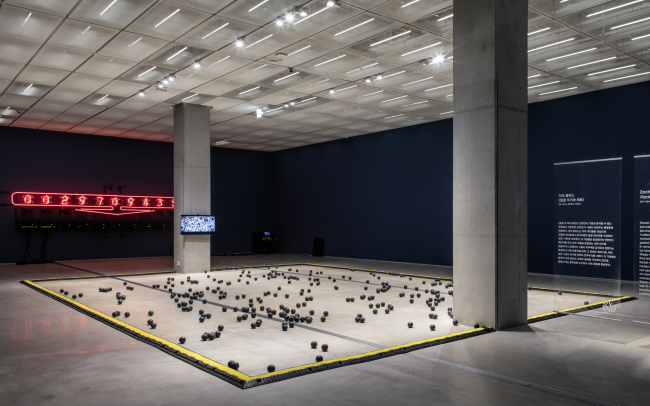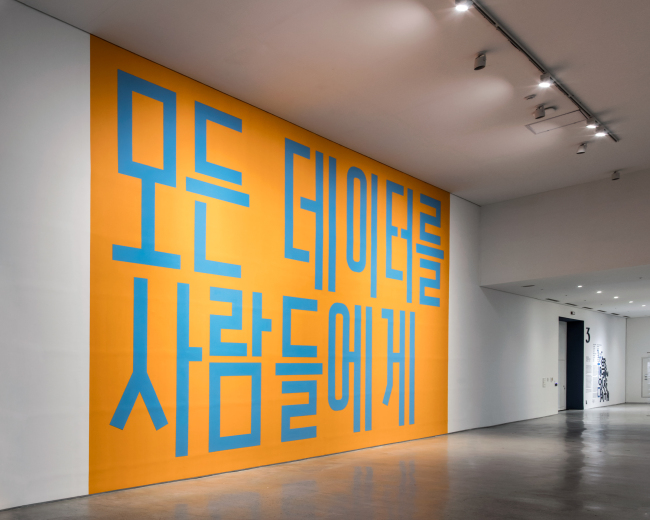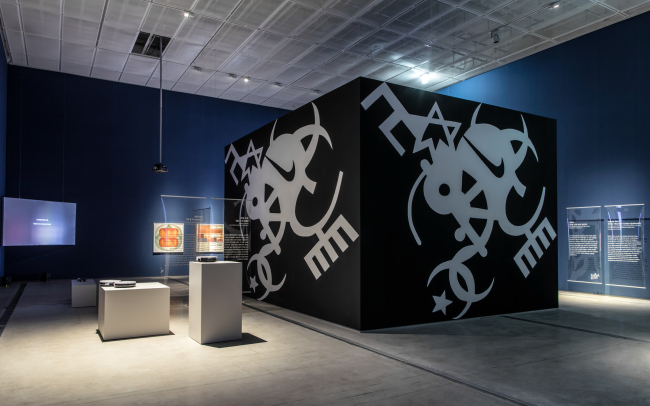MMCA exhibition ‘Vertiginous Data’ questions neutrality of tech
By Shim Woo-hyunPublished : April 3, 2019 - 17:48
Not many artworks on show at museums have price tags attached to them, but Rachel Ara’s installation work does. The large tech installation, a mass of devices and black cables, updates in real time its value on a screen in red neon numbers.
This seemingly “overcalculated and overcomplicated” tech-sculpture by Ara, titled “This Much I’m Worth,” is part of the National Museum of Modern and Contemporary Art’s latest exhibition.
This seemingly “overcalculated and overcomplicated” tech-sculpture by Ara, titled “This Much I’m Worth,” is part of the National Museum of Modern and Contemporary Art’s latest exhibition.

Showcasing experimental works by 10 artists and artist groups, “Vertiginous Data” at the MMCA attempts to suggest that seemingly objective data and technology are not neutral as they bring about various social, economic and ethical issues.
“My work is a commentary on who decides and controls the price of an artwork in the market,” Ara said.
Ara’s “This Much I’m Worth” makes extensive use of data-related technology. The value of the artwork on the screen is calculated by a complex algorithm she developed, called “endorsers.” The algorithm tracks mentions of the artist or her work on social media, art pricing sites and a stock market index as well as the number of exhibition visitors recorded through a web camera.
“The bottom line is that the art market is corrupt,” Ara said.
The artist seeks to raise the issue with the growing dominance of capital in the art market, in which the intrinsic value of artworks is eclipsed by monetary value.
While a few billionaires and major players hold sway over the art market, the rest are neglected. Among them are, of course, many female artists, she said.
Ara, who used to work in the technology industry for decades and has first-hand experience of male dominance, said such an asymmetric power dynamic between men and women also exists in the art market. Works by female artists sell for less, which leads to income differences, smaller studios and so on.
“The art market is stopping us,” Ara said.
Employing women only for her installations is a large part of her artistic practice.
Works on show at “Vertiginous Data” utilize up-to-date technology, yet also attempt to look beyond the effects that follow technological advances.
“The exhibition was first initiated in line with the experience shared by many people in the recent years, like the overheated cryptocurrency boom and its fall here. The exhibition looks into the vertiginous impacts that intangible data have in our tangible world,” MMCA curator Park Deok-sun said during a press conference.
The exhibition comes in three main themes: “How contemporary artists use data,” “Democracy and anti-feudalism in digital mechanisms” and “New ideas using digital mechanisms.”

The large and colorful slogan, “All Data to the People,” by Superflex is part of the artist group’s efforts to point out how data become concentrated in the hands of very few commercial and state players.
The exhibition also includes “The Green Island in the Red Sea,” a video work that tells a fictional history of the robot citizenry of Vallensbaek, a suburban municipality south of Copenhagen, Denmark. The film traces Vallensbaek’s history beginning with its progressive campaign for a robot integration policy in the 1970s.
Next to Ara’s work is Chris Shen’s “Phase Space,” consisting of a field in which balls equipped with engines move around, a camera on the ceiling that captures the movement of the balls and a screen showing the traces of the balls’ movements in real time.

Cao Fei’s “Rumba 01 & 02” portrays today’s China with its robot vacuum cleaners that constantly move about on the sculpture podium without ever falling. Also on view in the second section is Forensic Architecture’s “Ground Truth,” an ongoing project that focuses on the displacement of a Palestinian Bedouin village and the violent history that surrounds it.
By Shim Woo-hyun (ws@heraldcorp.com)







![[KH Explains] How should Korea adjust its trade defenses against Chinese EVs?](http://res.heraldm.com/phpwas/restmb_idxmake.php?idx=644&simg=/content/image/2024/04/15/20240415050562_0.jpg&u=20240415144419)











![[Today’s K-pop] Stray Kids to return soon: report](http://res.heraldm.com/phpwas/restmb_idxmake.php?idx=642&simg=/content/image/2024/04/16/20240416050713_0.jpg&u=)